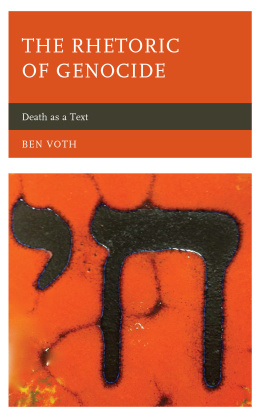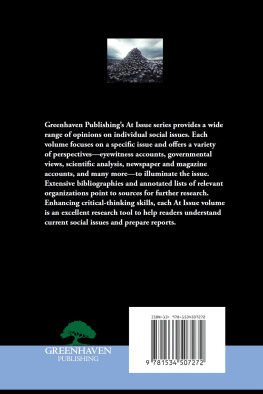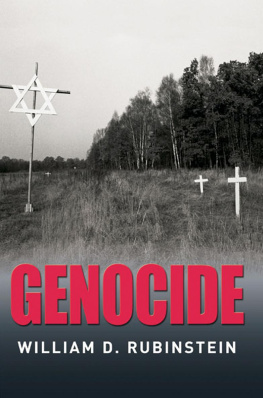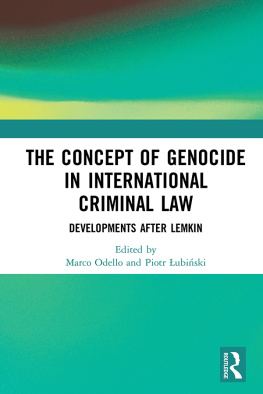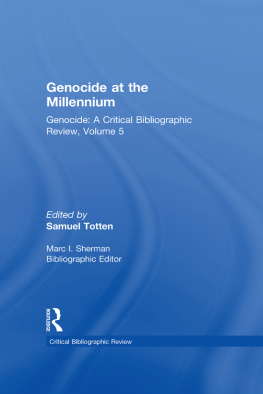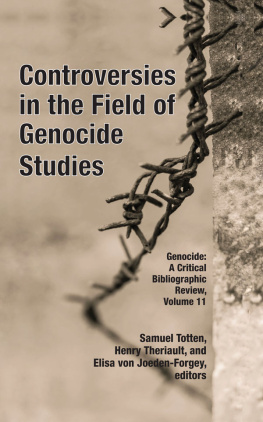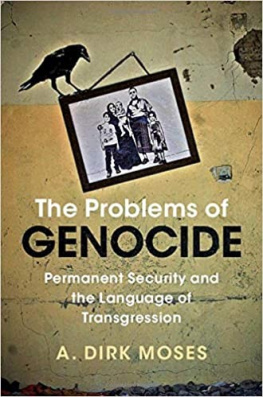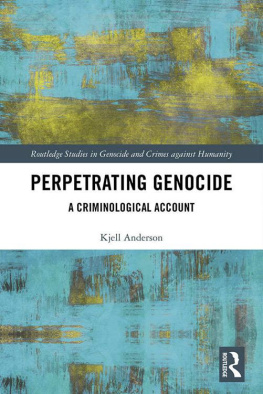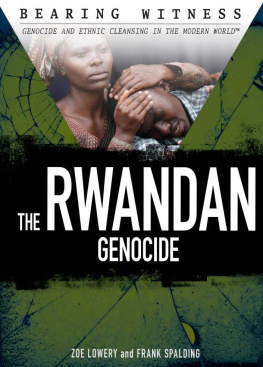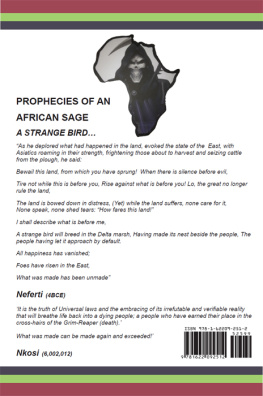Genocide
The Act as Idea
Pennsylvania Studies in Human Rights
Bert B. Lockwood Jr., Series Editor
A complete list of books in the series is available from the publisher.
Genocide
The Act as Idea
Berel Lang
UNIVERSITY OF PENNSYLVANIA PRESS
PHILADELPHIA
Copyright 2017 University of Pennsylvania Press
All rights reserved. Except for brief quotations used for purposes of review or scholarly citation, none of this book may be reproduced in any form by any means without written permission from the publisher.
Published by
University of Pennsylvania Press
Philadelphia, Pennsylvania 19104-4112
www.upenn.edu/pennpress
A Cataloging-in-Publication record is available from the Library of Congress
Cover design by John Hubbard
ISBN 978-0-8122-4885-2 hardcover
ISBN 978-0-8122-9364-7 e-book
For Lela, Nina, and Gabriel Kornfeld and Hannah, Leah, and David Riegel
Simon Dubnow : Obviously if killing one man is a crime, killing of entire races and peoples must be an even greater one.
Raphael Lemkin : Killing an individual is a domestic crimeevery nation deals with it... But murder of a whole people must be recognized as an international crime, which should concern not just one nation but the entire world.
Raphael Lemkins account of a conversation with Simon Dubnow in Riga, 1940.
[Soon afterward, Lemkin escaped to the United States; Dubnow was killed by the Nazis in December 1941.]
Contents
My books purpose is a defense of the concept and term genocide as it has evolved and been applied to the act of genocide that had a much longer history. Admittedly, even claiming a need for such a defense may seem questionable, since the concept is now so familiar and carries such weight in legal, moral, and popular discourse, announced in newspapers as well as learned journals, that a predictable reaction might be to ask why the term or idea would warrant a defense any more than the phenomenon itself would deserve one. But a defense is called for, in part because genocide, from its first appearance and continually since, has been criticized, conceptually and in its applications, on grounds of vagueness, obscurity, inconsistencyin sum, as inadequate for what it professes as its purpose. Such criticism has been accompanied, moreover, by proposals for replacement terms claiming to accomplish whatever genocide is intended to, and to manage that without its alleged faults. Beyond this, the concept has been charged with a failure to accomplish the goals ascribed to its formulation in the United Nations Genocide Convention (to prevent and to punish genocide) and also with opening itself to misuses of the term, as it has become virtually a catchall synonym for atrocity. If the concept of genocide is to sustain the legal and moral weight it has acquired, then this nest of basic and varied objections warrants a response that confronts and assesses them. It is this I attempt here, incorporating proposals based on certain of the charges, yet insisting on what I argue is the very important contribution that genocide has made to ethical and legal discourse. Far from conceding that the term should be discarded and replaced, as its most extreme critics have urged, I believe this incorporation strengthens its claims in asserting the distinctive crime of group-murder. The effectiveness of genocide itself, in naming, defining, and calling attention to the extreme phenomenon it refers to, is, I hope to show, compelling; the following discussion brings evidence and arguments to support this claim.
The book moves, then, along three related lines: first, analyzing the specific reference of the concept of genocide in its recognition of genocide as a distinctive act and crime; second, analyzing a number of objections raised in the pushback against genocide in its formulation and practical applications, and (as related to these) assessing the alternative terms or concepts proposed for replacing it; and third, responding with proposals for changes to certain flaws in genocide as identified by its critics although, as warranted, also by its advocates. The analysis as a whole revolves around the canonical formulation of genocide in the United Nations Convention on the Prevention and Punishment of the Crime of Genocide, which was passed by the General Assembly meeting in Paris on December 9, 1948 and which provides still the authoritativeunamendeddefinition of the crime. (The text of the Convention appears in the books .) This durability at least suggests the force of the basic concept of genocide, although the near-certain difficulty of reaching agreement on formal revision of the Convention in the present United Nations (with 193 nation-members now, in contrast to the 56 nation-members at the time of the Conventions initial, unanimous adoption) has clearly been a factor. One has also to recognizea point to be addressed laterthat the same avoidance of revision has found channels for criticism through other conventions or declarations related to human rights (such as the Universal Declaration of Human Rights) that might be taken to include the crime of genocide without specifically mentioning it and thus also accepting the problems found in it. In this sense, the defense here is a response also to avoidance or neglect.
Even aside from the assessment of specific points and means of criticism directed at it, the Genocide Convention has had an arguably irreversible impact on public and formal thought and practice. This effect is not itself proof of cogency, but it does suggest that any objections to the Convention and thus to genocide will have the burden of providing positive proposals that also take account of the specific character of genocidein this way retaining the core of the Convention. That the charge of genocide has also been misused in political, cultural, and popular discourse is indisputable, but the fault in that, it seems clear, has been in the concepts abuse, not in the concept. That the Genocide Convention has not since its adoption prevented occurrences of genocide as its title affirms is no more an argument against the Convention than is the violation of any other laws or regulations. The deterrent effect of laws is debatable in this instance as others; in any event, deterrence is not the only purpose or function of such legislation.
Thus the design of my account here and its defense of genocide: to analyze the principal objections that have challenged genocide conceptually and to scrutinize the alternative terms proposed as its replacements, recognizing warranted changes in the normative thinking about genocide. Why does such a defense matter? Most obviously because genocide itself matters: the act of group-murder that until the mid-twentieth century had remained an unidentified form of murder, unspecified in either the law or moral reflection. In the view defended here, the naming and conceptualization of the act of genocide marks a notable advance in the history of moral and legal thoughtprogress impelled by the need to catch up with the progress in human imagination and conduct that produced the acts of genocide themselves.
More than anyone else contributing to this advance in legislative and practical consequences as well as its conceptual formulation, Raphael Lemkin, coiner of the term genocide, warrants recognition. Such recognition has been slow in coming, and the discussion here, appearing almost simultaneously with several other books attesting to the theoretical and practical importance of his role, joins the effort to rectify that. It should be noted that Lemkins efforts on behalf of genocide also took an arguably decisive step in advancing the concept of group-rights, a still broader political and moral principle. Although Lemkin himself rarely used the term group-rights, the concept is implicit: to identify genocide as a crime against a groups existence without presupposing a groups right to life, analogous to a right to life for individuals violated by individual murder, would be inconsistentand this Lemkin recognized in just those words. The efforts required to realize these accomplishments were for Lemkin a lifelong, single-minded, and lonely struggle against traditional preconceptions and established political interestsa struggle epitomized in his early and solitary death. His monument was of his own design: the UN Convention on the Prevention and Punishment of the Crime of Genocide.


